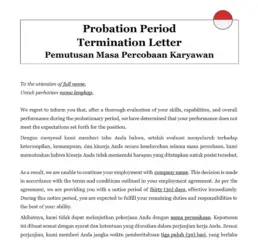Ready to use legal template
Drafted by experienced lawyers
Indonesian-English translation
Ready to use legal template
Drafted by lawyers
Indonesian-English translation
Learn more about Employee Probation Period Termination in Indonesia
In Indonesia, Employee Probation Period Termination refers to the act of concluding an employee’s employment during the probationary period. This period, typically at the start of the employment relationship, is designed to assess the employee’s suitability for the job. During this probationary period, employers have the opportunity to evaluate an employee’s performance, skills, and overall fit within the organization. Themis Partners offers you an easy-to-edit Employee Probation Period Termination template, drafted by lawyers to comply with Indonesian law.
Table of contents
What is an Employee Probation Period Termination in indoensia?
Why use an Employee Probation Period Termination?
What should it include under Indonesian law?
How is it different from Employment Termination Letter?
What if I don’t have an Employee Probation Period Termination?
Why terminate an employee during the probation period?
Can an employee challenge their termination in Indonesia?
What is an Employee Probation Period Termination in Indonesia?
An employee probation period termination refers to the decision by an employer to end the employment of a new staff member during their probationary period. During this initial phase of employment, typically lasting a few months, both the employer and the employee evaluate their suitability for the role and the organization. Probationary periods serve as a trial period, allowing employers to assess an employee’s performance, work ethic, and fit within the company. If an employer determines that the employee is not meeting the expected standards or fails to meet the requirements of the position, they may choose to terminate the employment during the probationary period. This decision is usually made after careful consideration, including performance evaluations, feedback, and discussions with the employee. While termination during the probation period can be challenging for both parties, it allows the employer to make adjustments and find a better fit for the position, while also offering the employee an opportunity to seek alternative employment that aligns better with their skills and goals.
Why use an Employee Probation Period Termination?
| ➤ Firstly, it allows the employer to assess an employee's performance and suitability for the role before making a long-term commitment. This evaluation period helps identify any potential red flags or performance issues early on, preventing long-term challenges or mismatches between the employee and the job requirements. |
| ➤ Secondly, probation period termination enables the employer to maintain a high standard of performance and productivity within the organization. If an employee fails to meet the expected standards during this trial period, it may indicate a lack of necessary skills, a poor work ethic, or a misalignment with the company's values and culture. Terminating employment during probation allows the employer to seek a more suitable candidate who can contribute effectively to the organisation's goals. |
| ➤ Lastly, probation period termination also benefits the employee. It provides them with an opportunity to reassess their fit for the role or seek employment that better aligns with their skills and aspirations, thus avoiding potential frustration and dissatisfaction in the long run. |




